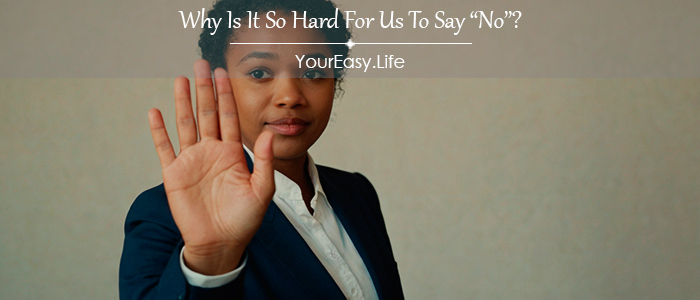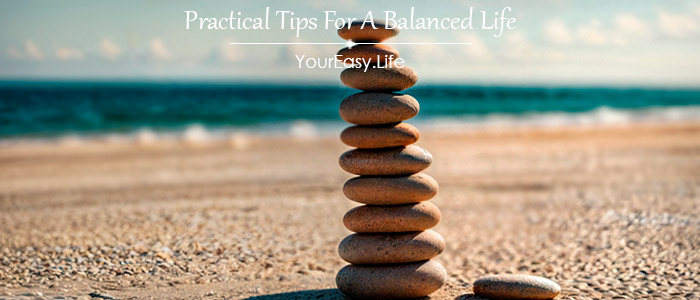Have you ever wanted to say “no” but just couldn’t muster the courage? Maybe it was a colleague asked for help when you were already swamped with your own tasks, or a friend insisted on meeting up, even though you really didn’t want to. It seems so simple, but something inside you wouldn’t let you refuse. You felt obligated, awkward, or maybe even afraid of the consequences. Why is it so hard for us to say “no”?
This seemingly simple word can carry a lot of emotional weight, and many of us find it incredibly difficult to say, even when it harms our own well-being. But you’re not alone — many people, myself included, face the same challenge. Let’s figure out why it’s so hard to say “no” and, most importantly, what we can do about it.
Table Of Contents
The Psychology Behind Our Fear Of Saying “No”
It’s not just you — there are many psychological reasons why it’s difficult to say “no” to someone, even when we really want to. At the heart of the issue is our natural desire to be liked and accepted. Humans are social creatures, and saying “no” can feel like a threat to our relationships. Have you ever felt that by saying “no”, you’d disappoint someone or make them think less of you? That’s where the fear comes from.
Psychologists say this behavior often starts in early childhood. If we were taught that saying “no” could lead to conflict or disappointment, we start to avoid it at all costs. But here’s the problem: constantly saying “yes” can lead to emotional burnout. When we put others’ needs ahead of our own, it inevitably leads to emotional overload, stress, and anxiety.
Have you ever felt completely drained or overwhelmed after agreeing to something you didn’t want to do? That’s one of the first signs that it’s time to reconsider your tendency to always say yes. When you begin to say “no” more often, you create space for rest and focus on what truly matters to you.
Cultural Pressures: Why We Feel Obligated
In addition to psychological reasons, cultural pressure also plays a significant role in shaping our behavior. In many cultures, especially those that emphasize community and cooperation, saying “no” can be seen as disrespectful or selfish. People are expected to agree “for the common good”, even when it doesn’t align with their personal wishes.
Have you ever been told, “Just agree, don’t make problems”? These subtle social expectations build up, making it feel almost impossible to say “no”. But here’s the important thing to understand — you have a right to set personal boundaries. Setting clear limits is crucial for maintaining mental health. It’s not about selfishness; it’s about conserving your energy so you can focus on what’s truly important to you.
The Consequences Of Not Saying “No”
When we don’t say “no”, it not only drains our energy but also sows the seeds of resentment and frustration. You’ve likely been in situations where you agreed to something out of obligation, only to regret it later. Maybe you said yes to helping out when you had your own responsibilities, or took on extra work even though you were already stretched thin.
What happens next? Over time, this leads to emotional exhaustion, irritation, and even physical symptoms like headaches or insomnia. Your body and mind are constantly working at full capacity to handle what you’ve said yes to. This leaves little room for self-care, rest, or your own projects.
So, how many times have you sacrificed your happiness or well-being because you couldn’t say “no”? How many times have you felt depleted or upset after agreeing to something you didn’t want to do? We’ve all been there. Sometimes it feels like we have to say yes to preserve relationships or avoid disappointing others. But you know what? Taking care of yourself isn’t selfish — it’s necessary. Putting yourself first means respecting your boundaries and protecting your emotional health.
How To Start Saying “No” Without Feeling Guilty
Now that we’ve discussed why it’s difficult to say “no”, let’s look at practical ways to overcome this challenge. You might be wondering, “Won’t people get upset if I refuse?” The truth is, some people might be disappointed — and that’s okay. It’s a normal reaction for them, but you’re not responsible for other people’s feelings. Your primary responsibility is to take care of your own well-being.
Here are a few tried-and-tested strategies to help you confidently say “no”:
1. Start Small
If saying “no” feels too daunting, start with small, less significant situations. For example, politely decline an invitation to a meetup you’re not interested in. Let this be the beginning, and over time you’ll build confidence and be able to set boundaries in more important areas of your life.
2. Use Assertive Communication
You don’t need to be harsh or rude to say “no”. Assertive communication is about being polite but firm. For instance, you could say, “Thank you for the offer, but I won’t be able to do that right now”. This shows that you value the other person’s request but also respect your own needs.
3. Explain If Necessary
Sometimes a brief explanation can soften the refusal. For example, you might say, “I have a lot on my plate at work right now, so I won’t be able to help”. But it’s important to remember that you don’t always have to explain your refusal. Sometimes just saying “no” is enough.
4. Practice Saying “No” In Front Of A Mirror
This may sound a little odd, but practicing your refusal in front of a mirror can really help build your confidence. When you practice, it becomes easier to say no in real-life situations.
5. Change Your Perception
Instead of viewing “no” as something negative, start seeing it as an act of self-care. When you say “no”, you’re protecting your time and energy. You’re giving yourself the chance to focus on what truly matters and preventing burnout.
How To Respond To Your Inner Critic
But what if you feel guilty after saying “no”? Guilt is a natural reaction, especially if you’ve spent years saying yes to everyone. The key is to recognize that guilt often comes from social conditioning. Remind yourself that you’re not responsible for other people’s expectations. Your time and energy are just as valuable as anyone else’s, and you have the right to use them as you see fit.
When guilt starts to creep in, ask yourself, “Will this “yes” benefit me in the long run?” If the answer is “no”, then you made the right choice by setting a boundary. Remember, self-care isn’t selfish — it’s essential.
Why It’s Important To Learn To Say “No”
Ultimately, learning to say “no” is about reclaiming your personal power. When you set boundaries, you show yourself and others that your time, energy, and well-being are important. This not only improves your mental and emotional health but also strengthens your relationships.
Imagine a life where you feel confident saying “no” without fear or guilt. Picture yourself handling social and work situations with ease, knowing that your boundaries are respected. You have the right to protect your energy, and the more you practice, the easier it becomes.
Conclusion: Why Is It So Hard To Say “No”?
In conclusion, the reason it’s so hard for us to say “no” is due to deep-rooted psychological and social factors, as well as our need to be accepted and loved. But by understanding these reasons and practicing boundary-setting techniques, we can take back control. Saying “no” isn’t just about turning down a request — it’s about self-care, respecting your needs, and living in harmony with yourself.
So next time you feel that familiar pressure to say “yes” when you really want to refuse, remember: you have the right to choose. Saying “no” doesn’t make you selfish — it makes you strong.
You’re not alone — we’re here with you every step of the way on your journey to a more balanced and fulfilling life. At YourEasy.Life, you’ll always find support, practical advice, and tools to improve your emotional well-being and achieve inner harmony. We’re in this together!
Frequently Asked Questions
Scientific Research, Data And Articles
- Baumeister, R. F., & Heatherton, T. F. (1996). Self-regulation failure: An overview. Psychological Inquiry, 7(1), 1-15.
- Neff, K. D., & Dahm, K. A. (2015). Self-compassion: What it is, what it does, and how it relates to mindfulness. In B. D. Ostafin, M. D. Robinson, & B. P. Meier (Eds.)
- Muraven, M., & Baumeister, R. F. (2000). Self-regulation and depletion of limited resources: Does self-control resemble a muscle? Psychological Bulletin, 126(2), 247-259.





